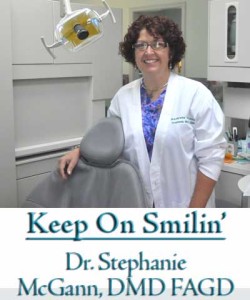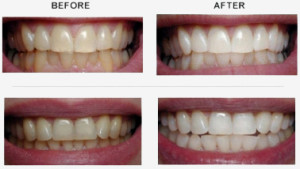Everyone wants whiter, brighter teeth, but not all solutions are created equally
By Dr. Stephanie McGann, DMD FAGD, Columnist, UnionvilleTimes.com
 There has been a lot of hype and controversy about dental whitening recently. Tooth whitening (bleaching) is one of the most frequently asked about dental procedures in most dental offices. We all want whiter teeth and an awesome smile. I never once in twenty+ years of practice had anyone ask for darker and more misshapen teeth. Never. Dental Whitening is safe and effective. How well it works varies greatly so today I am going to shed a little light on that white smile.
There has been a lot of hype and controversy about dental whitening recently. Tooth whitening (bleaching) is one of the most frequently asked about dental procedures in most dental offices. We all want whiter teeth and an awesome smile. I never once in twenty+ years of practice had anyone ask for darker and more misshapen teeth. Never. Dental Whitening is safe and effective. How well it works varies greatly so today I am going to shed a little light on that white smile.
What causes teeth to darken?
Over time drinks like wine, tea, coffee, soda and diet rich in artificial coloring agents can discolor the teeth. Cigarettes and smokeless tobacco are also implicated as serious offenders of a white smile. (We’ll save the health risks for another day) Poor oral hygiene can also cause darkening. Old dental materials and silver fillings can make a tooth appear darker; in some cases these should be replaced as part of the plan to whiten teeth. Teeth darken with age. (Sorry but it’s true)
If you feel your teeth are not as white as they could be you have options.
There are three major types of whitening.
The do-it-yourself over the counter products
These are the whitening products you can purchase at the drugstore, grocery store and (scary to consider) the dollar store. These products vary in composition and ingredients . These OTC whiteners range from toothpastes that whiten a bit as they clean removing surface stains if used continuously. Some are strips coated with a sticky agent with a peroxide based whitening agent. These products can whiten teeth to some degree but usually need to be used regularly and repeatedly to get any real noticeable difference. Keep in mind that spending 30-50 dollars every month for OTC results is often more costly than a professionally supervised prescription strength procedure.
Prescription strength dental whitening
These bleaching agents are available only through licensed dental offices. These work significantly better than OTC bleaches but require some professional supervision. These products are usually stronger than OTC bleaches and come in many different formulations to allow a dental professional to provide the safest most comfortable whitening for each individual. The best time to start a bleaching regimen is immediately following a professional cleaning. Professional dental whitening can be prescribed for home use or can be administered in a concentrated in-office process that may or may not involve the use of special activator light. The in-office bleaching is the strongest and fastest way to whiter teeth. There are numerous options available. Your dentist will use the products that work best for his or her patients.
Mall Kiosks, Cruise Ship, Spa and other designer whitening services
Buyer Beware. These venues may look like dental offices, but there is no dental professional associated with them. The process and materials used vary. In some cases you may be receiving an OTC whitening product applied by a person dressed in a nice white coat. In other cases you may be receiving prescription strength bleach without the security of professional supervision. As a dental professional, I believe that dental care is most safely delivered by appropriately trained, licensed and regulated dental professionals.
What is the downside?
Dental whitening is one of the most conservative dental procedures available. The most frequent downside is some dental sensitivity. This is usually short term and transient in nature. Whiter teeth can make fillings on front teeth more noticeable. It is often recommended to replace old restorations with newer ones that match the whiter shade of your smile. Sometimes the results are not what a person hoped for. Dental bleaching can be repeated.
While most teeth will lighten to some degree with bleaching, some types of discoloration are more stubborn. Patients who are habitual coffee or tea drinkers may need to touch up their bleaching more often than others.
Sometimes whiter is only part of the answer. If your smile is not what it could be, other cosmetic services may be part of the equation. Porcelain laminates (veneers) or crowns may make teeth whiter , appear straighter and eliminate the need for repeated bleaching procedures. Only a licensed dentist can let you know what all of your cosmetic dental options are.
Talk to your dentist, make a plan and then SMILE!
Whitening options at Dr. McGann’s Office
Dr. Stephanie McGann is a resident of the Unionville area and along with her partner, Dr. Marie Scott, operates The Brandywine Smile Center, a family-friendly dental practice in Concordville. She is a Fellow of the Academy of General Dentistry.







